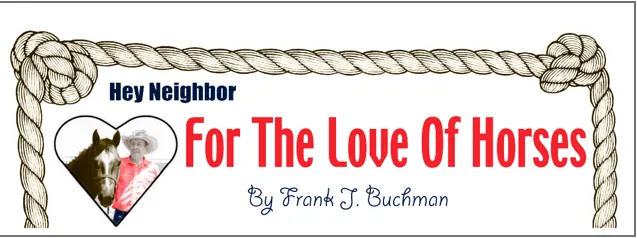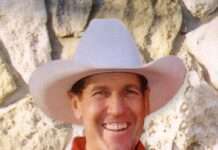By Frank J. Buchman
From the days of handling the lines of his father’s work team, horses have been close to his heart and soul.
“My initial interest in horses was directly influenced by how dad understood and handled horses,” credited John Teagarden of LaCygne.
That foundation developed Teagarden to be a livestock leader, highlighted by diverse involvement with horse activities and as a horse breeder
“I’m a farmer, enjoy farming, but I really like to work with horses, all phases of the business,” admitted Teagarden, who operates the Linn County farm where he was raised.
Enjoying reflecting his experiences, Teagarden is most emphatic in acknowledging mentors. “I’ve had a great life, and blessed to have good friends for guidance and inspiration,” the cowboy recognized.
“With my brothers, George and Richard, we had an Indian pony, a spotted mare called Fly. She was great to learn on,” Teagarden remembered.
A grey Thoroughbred-influenced mare, Gracie, mated to the registered Quarter Horse, Johnny Que, produced a star-faced black filly in the 1950’s.
“Star was one of the best horses we ever had,” Teagarden said. “George still owns the seventh generation of Star’s breeding.”
Participating in 4-H horse activities and Friday play nights at the Pleasanton, Kansas, Teagarden did it all on horseback growing up.
Off to K-State in 1959, Teagarden studied animal husbandry, excelling on wool, meats and livestock judging teams. “Dr. Don Good was a big influence, a great coach and teacher,” credited Teagarden
“We got to see some top horses on judging workouts including champions at the RS Bar Ranch where John Ballweg was the manager-trainer,” said Teagarden, 1962 high individual in collegiate horse judging at the American Royal.
. Enrolled in Ag journalism and photography classes, Teagarden developed fondness for media coverage. “I put that to use promoting the K-State Rodeo,” said Teagarden, also a rodeo bareback bronc rider for a time.
Upon 1963 KSU graduation, Teagarden was demanded for his livestock evaluation abilities. “I judged five county fairs that summer, all species. They paid $10 a day, and mileage,” he grinned.
While studying for a master’s degree in animal breeding, and working at the KSU beef barn in 1965, Teagarden was called by Professor R.B. Warren at the University of Nebraska to judge the Nebraska District 4-H Horse Shows.
“That was eight shows, with 2,168 entries. I learned so much, especially from R.B. Warren. He was such a great horseman, cowboy and judge,” said Teagarden.
At a Lawrence, Kansas, horse show, Candy Case on a bay gelding was pinned first in a horsemanship class by Teagarden.
Later, that cowgirl flashed a smile his direction as a KSU student. In 1969, they married, and the couple returned to Teagarden’s family farm.
Of course, there were Quarter Horses, along with 150 registered Simmental cows, a 200-sow farrow-to-finish operation and 750 acres cropland.
Downsized operations, Teagarden worked as an Emergency Medical Technician for several years, and Candy has been a Certified Public Accountant.
Today, they personally farm about 500 acres, and raise Quarter Horses.
Teagarden continued judging livestock and horse shows, a dozen or so annually, throughout Kansas, Missouri, Nebraska and Iowa, until just a few years ago..
“Our daughters Dana, Amy and Leigh exhibited all livestock in 4-H, and participated in horse shows, including the state fair,” Teagarden said.
Mares acquired from Francis Bliss at Howard were two-year-old state fair pleasure futurity projects for Dana and Amy.
“Those mares were retained and continue as foundation for our barrel horse breeding program,” Teagarden said.
Serving on the Linn County Fair Board since 1967, Teagarden has been heavily involved in work and promotion of the professional rodeo. “
The Eastern Kansas Pro Rodeo Series was initiated by Teagarden to attract more top cowboys and increase attendance.
Raising five to seven foals annually, Teagarden mates most of his mares to the best barrel racing sires in the country. “That’s possible through frozen and cooled semen,” Teagarden said.
“It’s a time consuming process, and we wouldn’t be able to do it without the work of our veterinarian Dr. Fred Gardner,” Teagarden credited.
Many of the Teagarden Quarter Horse mares are daughters of Rare Jet Extremes, a triple-A, all-around performance horse.
Foals are merchandized from yearlings up through started three-year-olds.
“I study our breeding program and keep up on accomplishments of the horses we’ve raised,” Teagarden said.
“No matter how much we know there’s still so much to learn about horses,” he insisted.
“This all wouldn’t have been possible without Candy sharing an interest in horses and helping in every way,” Teagarden qualified.
With professional careers, their married daughters have given the couple seven grandchildren, with horse interests, too.
No slowdown in sight for Teagarden. “I’m only 75, and been blessed with good health. Every year, we look to producing a better colt than the one before,” he said.



